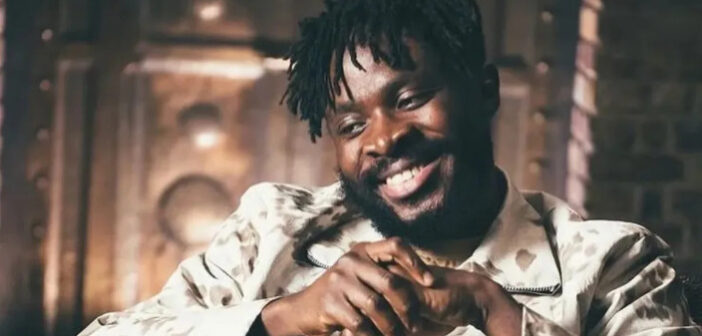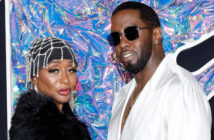British-Ghanaian Afrobeats artist, Fuse ODG, alongside his longtime manager, Andre Hackett, hopes that their new educational software will revolutionize the way that children learn about Black history.
With the help of his longtime friend and manager Andre Hackett, ODG has expanded his aim to enlighten, educate, and empower Black kids through a new tech company, an app called the School of New Africa, or SONA. It draws inspiration from and naturally builds on his “This Is New Africa” slogan, which propelled him to stardom in the 2010s. Young people between the ages of six and seventeen are the target audience for SONA, but users of all ages and backgrounds are encouraged to utilize it.
An App Built With Core Principles
“The app has always been part of the vision because I’ve always been passionate about telling our own narrative and just making people understand the reality of what Africa is to us,” Fuse ODG tells OkayAfrica. “That’s why the MOBO speech was so important because it was the biggest stage that I had at the time–and even for Afrobeats [as a genre].” ODG says he’s used the many different platforms available to him to pursue this vision–from music to fashion, videos, and the Nana Dolls. “One of the ways we knew where it was lacking was education,” he says. “We never had the depiction of how powerful our past is, and it has been very selective by just focusing on slavery. It did not align with our ethos. So for us, building our own curriculum was always part of the vision.”
To inform users on many facets of the history of Africa and the Diaspora, there are numerous apps available on the market. In contrast to Ambani Africa, which enables users to play games, read short stories, and learn vocabulary in seven African languages, including Swahili, Setswana, and isiZulu, African Facts provides facts about Africa and the flags of every country in the continent as well as sharing daily African proverbs.
The fact that SONA is based on the three pillars of “Love,” “Power,” and “Knowledge” sets it apart from other systems. A daily affirmation tracker to boost confidence is one example of “love.” By completing unique tasks that change desert landscapes, the games in “Knowledge” let users explore obscure African history and civilizations and learn languages like Swahili. Users can earn money through the game by using the “Power” aspect, which also teaches players about money management.
In addition to Robin Walker, author of Before the Slave Trade, and Nigel Stewart, founder of the School of Pan-African Thought in London, the team behind SONA enlisted the assistance and knowledge of reputable and well-known academics in Africana studies. These individuals include “Cultural Memory Specialist” Anthony Browder, director of D.C.’s IKG Cultural Resources, who is also known as a “Cultural Memory Specialist,” and Anthony Browder. They created scripts using their specialised knowledge, which were then given to entertainment writers who improved them for production.
The achievement of SONA is a long-term objective that ODG and Hackett have always aspired to. The lockdown during the pandemic offered a crucial chance to highlight the initiative. “If it wasn’t for the lockdown, this is something that we couldn’t have launched now,” says Hackett.
Africa Doesn’t Need Another Charity Song From the ‘Saviour’ West
“During the lockdown, we couldn’t tour, so we started developing it. It intersects with the music. I designed a lot of the process and the storylines, and did so listening to Fuse ODG’s ‘Libation,’ as the song is so futuristic. It inspired me to develop the app in its final form.”
The pocket money option found in the app’s ‘Knowledge’ section is another unique element that ODG is thrilled about. “You can sponsor your child or niece or nephew to learn about their histories, and as they’re doing that, they can unlock the pocket money you give them. They can learn how to deal with their budget, which is important for children to understand from an early age,” said ODG. In order to make it simple for young people to access the money they have earned through completing the SONA tasks set by their elders, he aims to link with banking partners on the continent where mobile money is more widely used.
The app is a component of ODG’s bigger effort to inspire his audience to take an active role in enacting social change. In college, he learned the importance of taking action to make a difference in his neighbourhood, especially when it comes to problems like adolescent criminality and the unfair portrayal of young Black boys in the media. He was motivated to make a documentary about the subject, which sparked interest from media organisations including the BBC. “It taught me that there is a way you can tell your own story, or a new narrative, by doing something constructive for the community,” he claims.
“Before Azonto blew up in the U.K., we went on tours across Liberia, Equatorial Guinea, Rwanda and the Congo, where we saw the beauty in those communities,” he says. “It brought us back to how underrepresented Black people are in the media. And that’s essentially how T.I.N.A. [This Is New Africa] was born. It’s how I learn to become more Pan-African, by traveling through Africa, seeing how beautiful our people are, and not seeing that translated in the media.”
In light of post-George Floyd discussions on community development, class, and racism, the world has changed into an intriguing environment for the musician to effect social change. He says, “We’ve been protesting and marching.” “The real protest begins with the mind, it begins in our homes, and it begins with our families.”




